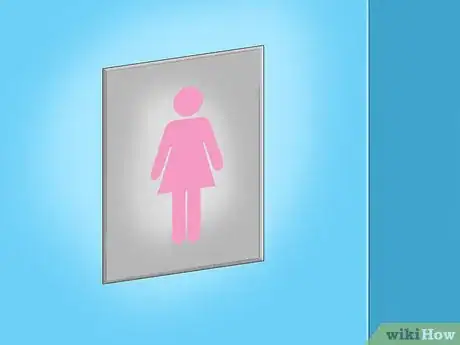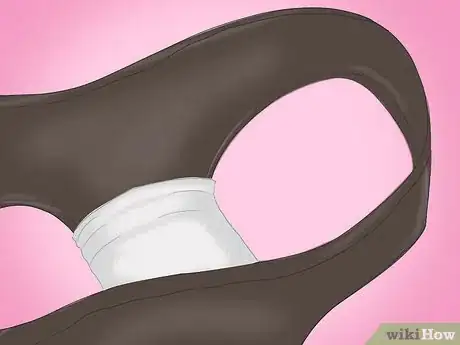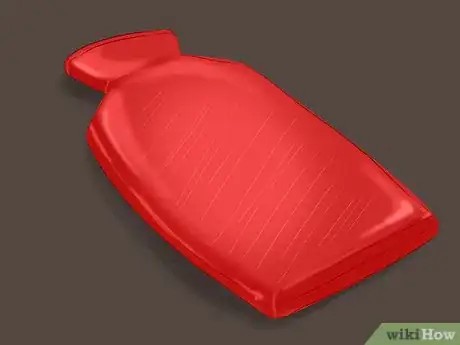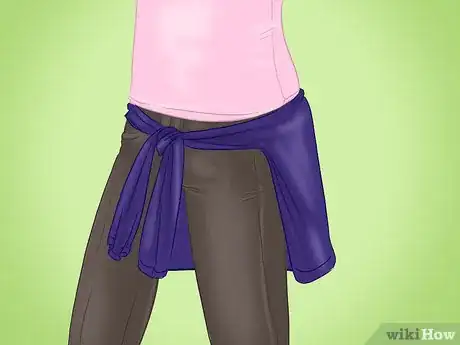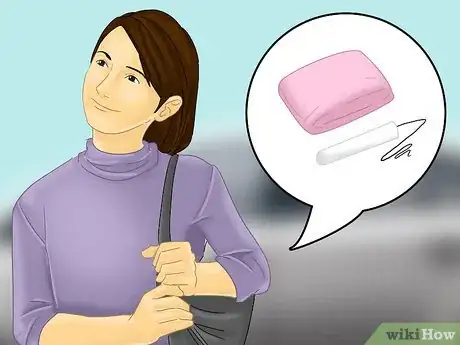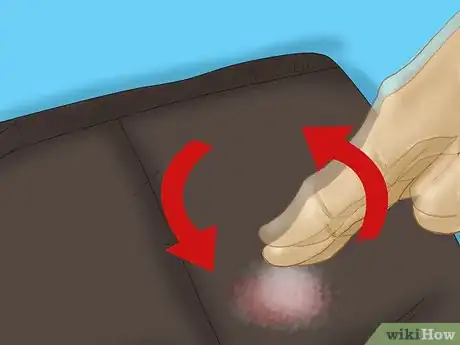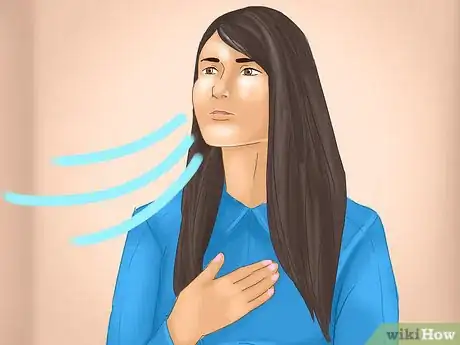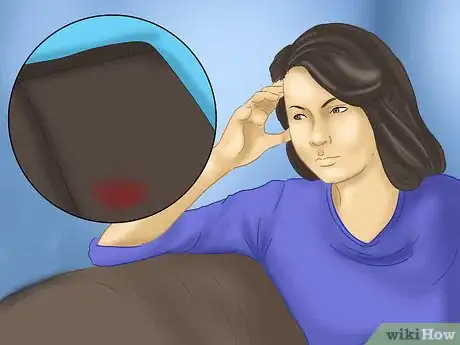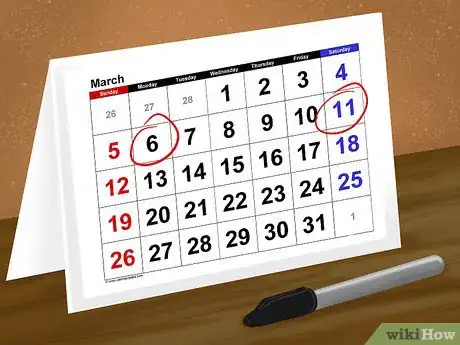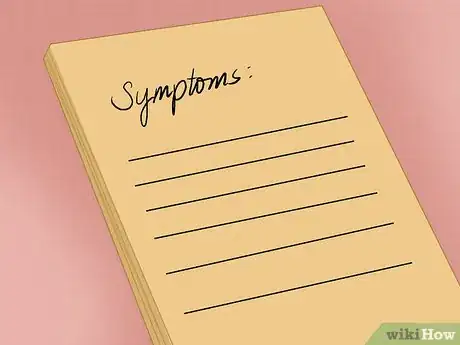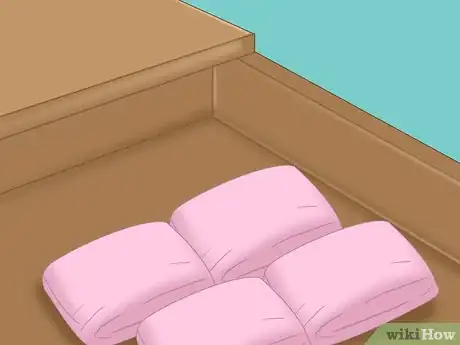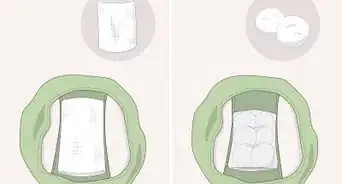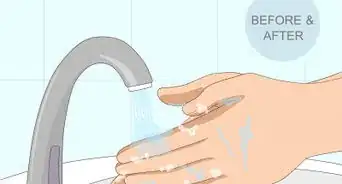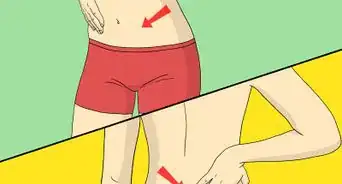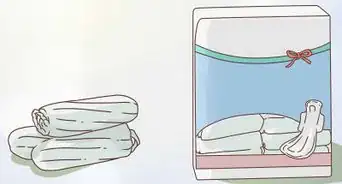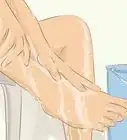This article was co-authored by Rebecca Levy-Gantt, MPT, DO. Dr. Rebecca Levy-Gantt is a board certified Obstetrician and Gynecologist running a private practice based in Napa, California. Dr. Levy-Gantt specializes in menopause, peri-menopause and hormonal management, including bio-Identical and compounded hormone treatments and alternative treatments. She is also a Nationally Certified Menopause Practitioner and is on the national listing of physicians who specialize in menopausal management. She received a Masters of Physical Therapy from Boston University and a Doctor of Osteopathic Medicine (DO) from the New York College of Osteopathic Medicine.
This article has been viewed 31,234 times.
Getting your period unexpectedly without having supplies can make you feel helpless and frustrated, especially if your flow is heavy or you’re wearing clothing that stains easily. The key to surviving this challenge is to stay calm, and use available resources to manage your period until you can get back home.
Steps
Dealing with the Crisis
-
1Visit a restroom as soon as possible. This allows you to assess your period in full so you can determine what supplies are needed for the time being. For example, a heavy flow will require a pad or tampon, while a lighter flow might only require a thin pantyliner.
- While everyone varies, many periods start off fairly light during the first few hours and get heavier as the first day progresses. Keep that in mind when deciding which supplies you’ll need. A thin pantyliner might be enough for now, but if your periods tend to get heavy, it might be best to plan ahead and choose something more absorbent.
- Excusing yourself to the restroom may be more difficult in some situations than in others. For instance, if you’re in the middle of a classroom, asking your teacher for a restroom pass could seem embarrassing even though there is no shame in doing so. If it makes you more comfortable, you might consider asking for a pass to the clinic instead, or coming up with another situation-appropriate excuse.
-
2Ask another female for spare supplies. Most women have faced an unexpected period in the past, and will offer you one or two supplies you can use in the meantime to help you through the day. Step outside of your comfort zone to ask strangers in the bathroom, female staff and co-workers, or female classmates who’ve already gone through puberty.
- Purchase pads or tampons from the feminine product dispenser, if available. These types of dispensers are located in most public female restrooms. If other females don’t have supplies and you lack cash, ask if they can spare some change so you can buy supplies.
Advertisement -
3Create a makeshift pad. Use toilet paper, gauze, and other supplies to create a makeshift pad. If you’re unable to track down supplies for your period, create a makeshift pad you can wear until you return home. For example, weave a generous amount of paper towels or toilet paper in and around your panties several times to secure it in place, or use gauze from the nearest available first aid kit.[1]
- Never wear makeshift tampons. Since tampons are inserted vaginally, makeshift tampons can increase your risk for toxic shock syndrome (TSS) if they contain bacteria, or are made from supplies that aren’t safe for your body.[2]
-
4Ease the pain naturally. If you’re experiencing menstrual cramps and don’t have any pain medication on hand, there are a few natural options you could try for quick pain relief.
- Heat is one of the most effective options, so if you have a heating pad readily available, try applying it to your lower abdomen until the cramps lessen in severity.
- Since a heating pad may not be available, you might also consider relaxing your abdominal muscles through deep breathing or progressive muscle relaxation. Lightly massaging your abdomen with your hands can also soothe sore, cramping muscles temporarily.
-
5Hide the evidence. Tie a jacket or sweatshirt around your waist if you suspect your period has leaked through your clothing. This often helps mask dark stains until you can return home or change clothing.
- You could also change into dark-colored clothing. If you’re at home and you don’t have supplies on hand, try changing into a dark-colored skirt, pants, or shorts, if available. Dark colors can help mask stains from your period if it’s going to be awhile before you can access supplies.
-
6Buy supplies as quickly as possible. If you’re in public and won’t be able to get home for several hours, or if you know you don’t have any supplies at home, you’ll need to head to the store and purchase what you need as soon as possible. Depending on your preferences and needs, this might mean pads/tampons, pain relievers, and adhesive heat patches.
- Buying your own supplies might seem daunting if you’re young and have never done so before, but keep in mind that this is an experience shared by all women. There’s nothing to be ashamed of.
- If you still feel embarrassed, however, try to go to a store with multiple checkout lanes, and search for a lane operated by a female cashier since this may seem less embarrassing than approaching a male cashier. Another option would be to choose a store with self-checkout lanes so you can avoid the cashier altogether.
-
7Clean up stains after getting things under control. Absorbing fresh blood and securing supplies should be your top priority, but once all of that is taken care of, you might want to clean blood stains from your clothes--especially if blood got on your favorite skirt or soaked through your most comfortable panties.
- There are many different options you could try, but if the stain is fresh and relatively small, first try blotting it with cold water. Add a little salt or laundry detergent to the water, or try a special stain removal agent, and dab at it with your fingers until it starts to lift away. You should then be able to wash it as usual, but make sure you use cold water to avoid setting the stain.
Managing Your Response
-
1Understand this happens to almost all women. At some point in most every woman’s life, she faces at least one unexpected period without having supplies on hand. Don’t allow yourself to feel frustrated, angry, or helpless when this happens; just acknowledge that it’s happened, and that you can prevent it from happening again in the future.[3]
- You may feel tempted to delay action due to feelings of embarrassment, but delaying will only give your period more time to soak through your clothes. The sooner you accept the situation for what it is, the sooner you’ll be able to take care of the problem and move on from it.
-
2Stay calm. The calmer you feel, the more effectively you can handle and address the situation in a timely manner. Plus, staying calm without panicking or making a scene helps you avoid alerting others to your personal dilemma.
- If you need to calm down, try some deep breathing: inhale slowly over a count of four, hold your breath for another four seconds, then exhale slowly over another four seconds. Repeat as needed until you steady your nerves.
- You can also try reframing negative thoughts more mindfully and more positively. For instance, instead of thinking, “Everyone will find out and tease me,” try something more forgiving and proactive, like “This is an uncomfortable situation, but it’s temporary and normal, and I’ll get through it soon enough.”
-
3Keep explanations limited. You might worry about others finding out that your period started, especially if blood soaked through your skirt or pants. The best way to handle the situation is to tell as few people as possible, and provide as little information as possible to those people.
- While there’s nothing to be ashamed of, it’s fairly normal to feel embarrassed about your period around guys, especially if you’re still young. If any guys ask what the problem is--whether they’re authority figures like teachers or bosses, or casual figures like classmates or coworkers--feel free to skip the messy details and simply say you aren’t feeling well. You can then excuse yourself from the situation without it looking odd.
-
4Plan some self-care. Periods can be stressful enough without the drama of being caught without supplies. One way to make the experience less traumatic is to turn it into an excuse to pamper yourself. Get through the moment by planning a relaxing activity you can enjoy when you get home and have time to rest.
- For instance, you could curl up on the couch with your favorite comfort food and binge-watch your favorite TV series. Sappy or funny movies can work equally well.
- Light exercise is another option. Going for a walk may not seem enjoyable when you’re doubled over in pain, but light exercise can help reduce cramps and make you feel better overall. Plus, if you walk somewhere enjoyable--e.g., a beautiful park--you might find the experience rewarding emotionally, as well.
Preventing Future Emergencies
-
1Learn from the experience. This experience might be one you want to forget about, but it’ll be better for you if you learn from the experience before wiping it from your memory. Figure out why you were caught off-guard and brainstorm solutions to prevent the problem from happening again.
-
2Track your period. Keep track of your period every month so you can make sure you always have supplies. The average menstrual cycle is 28 days, but can range anywhere from 21 to 45 days. The more familiar you are with your body, the better you can predict when your period is coming.
- You can mark the start and end dates of your last period on the calendar, and do the same for each one that follows. Over time, you should be able to average the number of days in between periods, making it easier to know when yours is coming. You could also consider using a period tracking app to help you track your period in a similar manner.
-
3Note symptoms you experience every month before your period. This helps you predict when your period is coming so you can make sure you have supplies. Menstruation causes side effects such as breast tenderness, bloating, cramping, and acne breakouts. You may also notice increased irritability or fatigue.
- While there are certainly similarities between most women, every woman’s body is a little different, so it’s best to familiarize yourself with your own pre-menstrual symptoms. Consider making a note of your symptoms in your journal, if you keep one, or creating a separate journal for this purpose.
-
4Keep supplies in multiple locations. Store pads and tampons in several places so you always have supplies nearby. For example, store supplies in your purse, backpack, car, desk, locker, and all bathrooms in your home.
- Instead of waiting for the next time you’ll need supplies, restock your supplies as soon as your current period ends. That way, you’ll be prepared well in advance and won’t have to worry about it when the time comes.
Expert Q&A
-
QuestionIs it bad if my period is irregular?
 Rebecca Levy-Gantt, MPT, DODr. Rebecca Levy-Gantt is a board certified Obstetrician and Gynecologist running a private practice based in Napa, California. Dr. Levy-Gantt specializes in menopause, peri-menopause and hormonal management, including bio-Identical and compounded hormone treatments and alternative treatments. She is also a Nationally Certified Menopause Practitioner and is on the national listing of physicians who specialize in menopausal management. She received a Masters of Physical Therapy from Boston University and a Doctor of Osteopathic Medicine (DO) from the New York College of Osteopathic Medicine.
Rebecca Levy-Gantt, MPT, DODr. Rebecca Levy-Gantt is a board certified Obstetrician and Gynecologist running a private practice based in Napa, California. Dr. Levy-Gantt specializes in menopause, peri-menopause and hormonal management, including bio-Identical and compounded hormone treatments and alternative treatments. She is also a Nationally Certified Menopause Practitioner and is on the national listing of physicians who specialize in menopausal management. She received a Masters of Physical Therapy from Boston University and a Doctor of Osteopathic Medicine (DO) from the New York College of Osteopathic Medicine.
Board Certified Obstetrician & Gynecologist While it’s fairly normal for teens to have irregular periods, if your periods are highly irregular, very painful, or very heavy, it might be best to consult your gynecologist. They can rule out any treatable or severe problems, and work with you to find ways to regulate your period in the future.
While it’s fairly normal for teens to have irregular periods, if your periods are highly irregular, very painful, or very heavy, it might be best to consult your gynecologist. They can rule out any treatable or severe problems, and work with you to find ways to regulate your period in the future. -
QuestionHow do I figure out what absorbency level I need for my tampons?
 Rebecca Levy-Gantt, MPT, DODr. Rebecca Levy-Gantt is a board certified Obstetrician and Gynecologist running a private practice based in Napa, California. Dr. Levy-Gantt specializes in menopause, peri-menopause and hormonal management, including bio-Identical and compounded hormone treatments and alternative treatments. She is also a Nationally Certified Menopause Practitioner and is on the national listing of physicians who specialize in menopausal management. She received a Masters of Physical Therapy from Boston University and a Doctor of Osteopathic Medicine (DO) from the New York College of Osteopathic Medicine.
Rebecca Levy-Gantt, MPT, DODr. Rebecca Levy-Gantt is a board certified Obstetrician and Gynecologist running a private practice based in Napa, California. Dr. Levy-Gantt specializes in menopause, peri-menopause and hormonal management, including bio-Identical and compounded hormone treatments and alternative treatments. She is also a Nationally Certified Menopause Practitioner and is on the national listing of physicians who specialize in menopausal management. She received a Masters of Physical Therapy from Boston University and a Doctor of Osteopathic Medicine (DO) from the New York College of Osteopathic Medicine.
Board Certified Obstetrician & Gynecologist This is kind of a varied question, and a lot of this is going to come down to trial and error. Most women will bleed more or less the same amount every time they have their period, so once you figure that out you should be golden. You want a tampon that's absorbent enough to soak up all of the blood that comes out. If you can leave it in for up to 4 hours and you don't have any leakage, it's a good tampon for you.
This is kind of a varied question, and a lot of this is going to come down to trial and error. Most women will bleed more or less the same amount every time they have their period, so once you figure that out you should be golden. You want a tampon that's absorbent enough to soak up all of the blood that comes out. If you can leave it in for up to 4 hours and you don't have any leakage, it's a good tampon for you.
References
- ↑ http://jezebel.com/5812246/diy-pad-crisis
- ↑ http://thestir.cafemom.com/healthy_living/171283/13_period_disasters_how_to
- ↑ Rebecca Levy-Gantt, MPT, DO. Board Certified Obstetrician & Gynecologist. Expert Interview. 3 April 2020.
